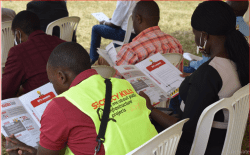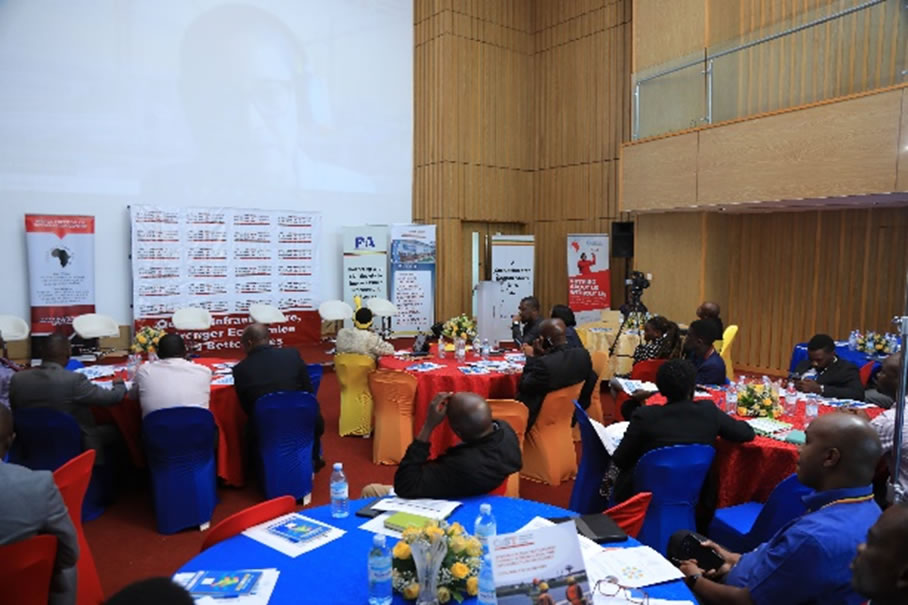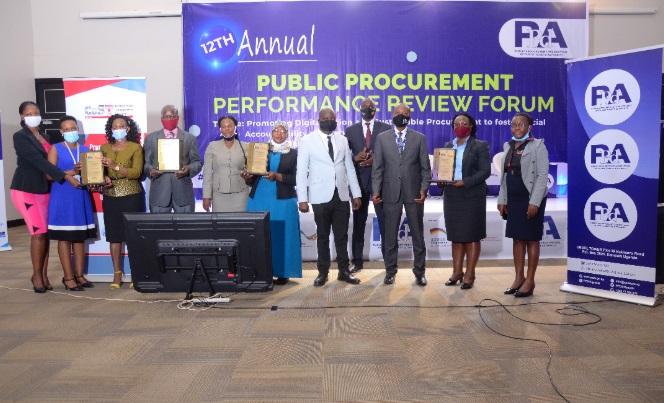
CoST Uganda in partnership with PPDA, organized a policy awareness webinar to provide a platform for the private sector to discuss key policy issues that inhibit their effective engagement in public infrastructure procurement. The webinar that was held on 17th September 2020, via Zoom, was an opportunity for the Public Procurement and Disposal of Public Assets Authority (PPDA), to interface with contractors and consulting engineers to further share key policy provisions, criteria, and expectations to inform the private sector’s eventual participation in infrastructure procurement.
CoST Uganda conducted an analysis of disclosed public infrastructure procurement data published on the Government’s Procurement Portal (GPP) whose results revealed that 25 projects (80.6%) had their contract prices lower or equal to bid prices while six (6) projects (19.4%) had contract prices higher than the bid prices. The former is the ideal condition in contracting, a phenomenon where the contract price is higher than the bid price unless derived from the process of error correction provided under the PPDA evaluation procedures, is suspect and could be an indicator of conflict of interest and possibility of corruption practices in the procurement process. From the results of the analysis, at least eight (8) in every 10 projects were awarded at prices lower or equal to the bid prices. The finding indicates that contracts are largely awarded at the bidder’s offer price and that any upward price adjustments after award is basically not possible.
The results of CoST Uganda’s data analysis report thus underscore the value of effective project cost estimation to ensure that the bid prices quoted are feasible and cover the cost of implementing the project while offering a fair return to the contractor as well. Contractors should therefore enhance their knowledge and skills in project costing to avoid situations of underpricing (a case of abnormally low-priced bids), where the contract price cannot meet the cost of implementing the projects and the target rate of return or overpricing the bid where either case could lead to rejection of the bid. Most firms have lost in procurement due to a lack of information and feedback on the criteria being used to evaluate bids, reasons for not being selected in previous submissions, and other procurement provisions, few firms will further their efforts to engage in procurement. Another key observation has been the lack of knowledge and understanding of the existing policy framework for public infrastructure procurement, provisions under the preference and reservation schemes.


During the webinar, Mr. Moses Ojiambo the Director of Capacity Building, PPDA said that as the Government supports local providers in the market, they were urged to step up and become proactive. “Local firms can only be involved in infrastructure procurement processes if they are meeting the required standards,” said Moses.
The webinar attracted a total of 40 participants including contractors and consulting engineers from within and outside Uganda. Speaking as Guest speaker, Eng. Hamish Goldie-Scot, a CoST International Assurance Expert, who has also over 20 years’ experience in private sector consulting work, and experience in Uganda’s public infrastructure work, emphasized the need for “Trust building between key stakeholders in the sector” noting that, trust is very key for all stakeholders conducting procurement, as this, helps improve the performance of public procurement in the country. He also shared experiences on private sector participation in public infrastructure procurement processes giving an insight into the global arena in reflection to Uganda’s situation.


From her end, Ms. Faith Mbabazi, the Senior Research Officer at PPDA gave an overview on existing strategies to increase local participation in the procurement process & create a more level playing field for the contractors and consulting engineer in getting more business.
Section 50 of the PPDA Act 2003 provides for the implementation of preference and reservation schemes. The anticipated benefits of the Preference and Reservation Schemes as noted by Ms. Faith include;
- Increased local labor, goods, and services in the delivery of projects.
- Increase in employment and skills development.
- Increased domestic and foreign investment.
- Technology and knowledge transfer from international companies.
- Promote local ownership/ sustainability of Government projects
Preference schemes are to be applied in respect of goods, works, and services, where the open domestic or open international bidding methods are used. Preference is given to:
- Goods manufactured, mined, extracted, or grown in Uganda (15%).
- Works by Ugandan contractors or services provided by Ugandan consultants (7%).
- Joint Ventures (4%)
Talking about Local content, a topic that has generated a heated debate lately within the private sector in Uganda, Ms. Faith noted that, in 2018, the Authority issued guidelines on reservation schemes to promote local content in public procurement. The guidelines provided for exclusive reservations for both national and resident providers. The guidelines provide for Reservation by threshold;
- Road works (UGX 45 Billion and below),
- Other public works (UGX 10 Billion and below),
- Consultancy services (UGX 1 Billion and below),
- Supplies (UGX 1 Billion and below.) and
- Non-consultancy (UGX 200 Million and below).
She also emphasized that Government entities are required to disclose in their procurement plans the procurements that shall be subjected to reservation. The bidding documents for these procurements should specify that the schemes will be applied. And that, reservation to apply to Procurements funded by the Government of Uganda and to procurements funded by development partners except where the conditions of funding limit the application of reservations. She however pointed out some of the challenges in the implementation of reservation schemes such as the high cost of Bidding in terms of required Bid securities; and additional challenges that may not be addressed by the preferential treatment including; the cost of doing business, access to credit, lack of adequate capacity to supply large projects.
But all is not lost, there is hope at the end of the tunnel, Private sector companies were encouraged to form joint ventures with foreign firms with more experience, capacity and resources, engage Entities to review qualification requirements in terms of experience and turnover to allow for participation of local contractors: Package the projects to fit within the thresholds. The government is rolling out the E-government Procurement system; this will reduce the physical interface between providers and the officials responsible for procurement; hence, reducing the space for negotiating corruption. The system will also foster timely access to information, lower transaction costs, and quicken the bidding process among others. The government will also be reviewing the implementation of the provisions for sub-contracting, of entities, turning guidelines into regulations, and collaborating with non-state actors to support monitoring and awareness raising on contract transparency and regular monitoring to enable compliance.
During the webinar, Uganda National Roads Authority’s Director of Procurement, Mr.John Omeke, noted that, the entity has established an affirmative action programme to strengthen local content, specific tenders are reserved for local firms. However, he noted that most local contractors don’t have experience in tarmacking roads, in small roads of about 20 billion, they propose sub-contracting if local companies can propose subcontracting and in the end, give the jobs to foreign firms in sub-contracting.
UNABCEC Director, Ms. Elizabeth Muhebwa noted that one of the most pressing issues affecting the private sector is the VAT requirement.VAT is required to be remitted by the constructing firms every 15th day of the month (when contracts are running) and yet invoices of construction firms are not yet paid by respective Procurement Entities by then. This is a big challenge to the private sector as in most cases, many of them have lost property or been penalized due to delayed remittance of VAT, PEs never consider such situations while delaying payments. It is thus important that issues of VAT and delayed payment are given more consideration. PPDA committed to raising the concerns on delayed payments with the Ministry of Finance to have it addressed.
The webinar was an opportunity for stakeholders to interface and share ideas. At the same event, PPDA announced its partnership with CoST Uganda to create continued awareness raising on key issues in the sector, benefits, and existing opportunities. In addition, to further understand the challenges affecting private sector engagements, PPDA and CoST Uganda will commission a study on factors affecting private sector participation in public infrastructure procurement processes in Uganda. The duo will also be aligning the E-GP to the Open Contracting for Infrastructure Data Standard (OC4IDS) to promote disclosure of infrastructure data, train public officials on disclosure, and further performance monitoring through enhancing contract performance. The participants agreed that such engagements are very vital for information sharing and would be organized on a quarterly basis. CoST Uganda is pleased to host the platform that will be discussing issues of fair business practices between Government and the Private Sector on a quarterly basis.





